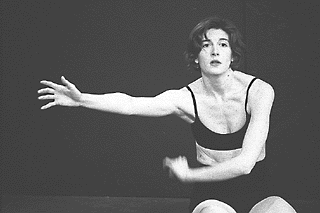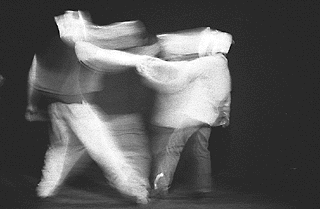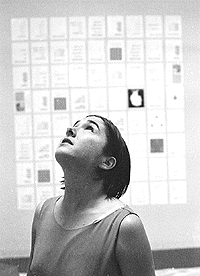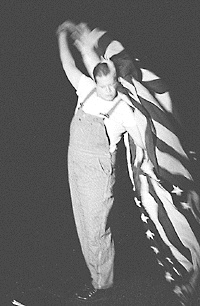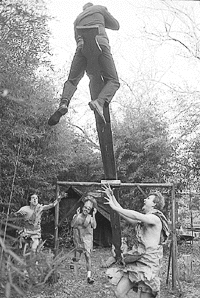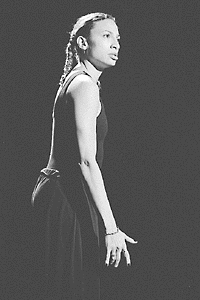https://www.austinchronicle.com/arts/1998-02-13/522795/
A Welcome Place
FronteraFest `98: Bigger but Still Room for Everyone
February 13, 1998, Arts
|
|
Frontera Fest, that annual performance orgy, is the most important event on the Austin theatre calendar. Period. Five weeks chock-full of folks trying something new and different, with varying degrees of success, but up there, loud and proud, for all the city to see. For Fest audiences, it's like a carnival: You never know what the next act will be, you know only that somehow it will be completely unlike anything that has gone before. Encompassing everything from personal monologues to dog/unicycle acts to naked women drifting through the audience to living room dramas about ennui, the scope of the Fest is difficult to sum up in a small book, much less 2,000 words in an alternative weekly. But talk about the Fest we must; its momentum just keeps building, sucking in artists from here and across the country and giving theatregoers the chance to see the talent that has been breeding in living rooms and rehearsal halls in Austin. The current Fest, winding up this weekend with a showing of the cream of this year's crop, is the biggest yet, with 800 artists involved in over 50 performances, a half-dozen featured artists, weekly workshops and performance jams, an open-canvas project, a sound series, and Mi Casa Es Su Teatro, a one-day jamboree of 12 pieces spread over Central, East, and South Austin. Phew. Just listing all the sundry components is exhausting. Now in its fifth year, the Fest keeps building steam, in part because of the connection that Frontera has made with the national theatre community, in part because the Austin audience keeps coming back for more. Hyde Park Theatre, home for many of the Fest's events, is packed to the gills almost any given night now, full of welcoming crowds that receive everything the Fest has to offer warmly, no matter how strange.
|
|
To understand the Fest and its success, it helps to think first about hospitality. Not some kind of stuffy Emily Post etiquette, but a way of treating people, with consideration and thoughtfulness and warmth. It's the kind of hospitality you use in thinking of the needs of a guest in your home, considering in advance the information that he or she needs to feel welcomed and comfortable. In the theatre, it involves an admission that everyone in the building is going on the same journey, wrapped in the same four walls, with some ground rules of decorum implicitly in place.
|
|
Adrienne Martini: This Fest has been one of the more overtly hospitable, since several pieces brought the theme out of the subtext and into the light. Before he began his show, Liberty, featured artist Chris Wells introduced himself to audience members, which was kind of scary considering that Wells is a very big man with green hair and a blue face. Local playwright Hank Schwemmer passed out chocolate cookies during You Want It When, a soundscape featuring six boom boxes and a soon-to-be-smashed micro-cassette recorder. Lisa D'Amour, before her piece Dress Me Blue/Window Me Sky, offered a variety of tiny foods to the audience and encouraged their consumption during a snack break built into the piece.
Robert Faires: It seems that part of playwright Erik Ehn's legacy to the independent/alternative theatre artists and companies of today is the notion of hospitality as a vital element in theatre. In the RAT movement, that notion is most often discussed in reference to an alternative to cash. If you can't afford to pay an artist what you'd like, you compensate them in other ways: lodging, food, drink, a plane ticket, free rides,.... It's a way of demonstrating that you still value who the artist is and what he or she does, but it communicates it in a more personal way. `To thank you, I give you part of my house, my table, myself.'
|
|
AM: Overt, physical offerings are not the only devices used in the Fest to include the audience in this communication transaction. This year has also been blessed with well-thought-out pieces that offer an artist's best work to an audience instead of mere scraps of an unrehearsed idea. While every piece may not have been sheer genius, the polish on the `98 crop of acts proves that the artists put long, hard hours into their development. They wanted to feed the audience and not waste its time. This may be one of the things that is most gratifying to an audience, the ability to see the sweat and preparation that went into the work. It intensifies the audience's need to welcome it onto the stage.
RF: The audience plays a big part in the success of the Fest. Audiences at FronteraFest are supportive in an extraordinary way, unlike anything at any other theatrical event in town. They're so willing to go on any journey with the performer. That's not to say that they'll like it necessarily or that they'll get what the journey is about or that they won't wish the trip was shorter, but every crowd I've ever sat with in the Fest has offered its support to every performer with a whole heart. And when a piece was over, even if the group as a whole was not engaged or felt its
|
|
And audiences get a sense of that liberation by association, I think. You get an awful lot of "loved ones" in the house at each show, family and friends of the performer, and I always can feel the pride coming from those parts of the house. Here's someone they know taking a risk. It may be a small risk in the grand scheme of things - getting in front of 60 or 80 people on a tiny stage in Austin, Texas to move or act or present a short something they've written - but it's a risk all the same, putting some-thing new out there for a bunch of strangers on a stage. I think the stage still awes people. The idea of being "in the light" with everyone focused on you intimidates them. So when someone they know steps into that spot, it's an act of daring. People take risks sometimes to feel bigger than themselves, and when they can do some-thing like FronteraFest - tell a story onstage or dance a dance - it lets them break out of their life, who they are 99% of the time.Even someone who's been involved in theatre as long as I have - when I wrote a piece for the Fest and performed it, I felt that. It was something different, unexpected, chancy, but liberating. The audience members who know someone taking that leap - and maybe those who don't know anyone, too - admire the risk and feel some of that chancetaker's burst of freedom.
|
|
AM: Perhaps the larger issue is intimacy, a feeling that can only come once you have welcomed an act into your psyche without first setting walls against it. FronteraFest removes the boundaries and makes the stage a welcome place to try almost anything in front of an audience who yearns to get closer to you, so much so that you can almost feel it radiating in from the seats. It's the place where you can tell your deepest, darkest secret and not be afraid of rejection, as long as it's told in an engaging manner and does not seek to alienate the forgiving crowd.
The Fest is also a place where a critic, whose palms sweat at the thought of public speaking, can stand onstage, feel completely at ease, talk about the wonderfulness of the event while plugging the workshops, then force a roomful of strangers to guess her age so that they can get discounts on season passes. The crowd was kind. Kind, except for the woman who guessed 32. Not that there's anything wrong with 32, but I have a few years before I even have to deal with 30.
RF: You hadn't told me this, but I love it. Um, except for the woman guessing 32 part. Hated that. She should be shot.
FronteraFest `98's Best of the Fest runs through February 14, Thu-Sat, at Hyde Park Theatre, 511 W. 43rd. Call 454-TIXS.
Copyright © 2024 Austin Chronicle Corporation. All rights reserved.

